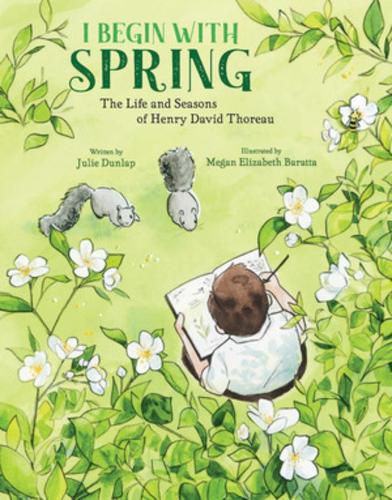Readings Newsletter
Become a Readings Member to make your shopping experience even easier.
Sign in or sign up for free!
You’re not far away from qualifying for FREE standard shipping within Australia
You’ve qualified for FREE standard shipping within Australia
The cart is loading…






Early Bloomer weaves natural history around Thoreau’s life and times in a richly illustrated field notebook format that can be opened anywhere and invites browsing on every page. Beginning each season with quotes from Thoreau’s schoolboy essay about the changing seasons, Early Bloomer follows him through the fields and woods of Concord, the joys and challenges of growing up, his experiment with simple living on Walden Pond, and his participation in the abolition movement, self-reliance, science, and literature.
The book’s two organizing themes-the chronology of Thoreau’s life and the seasonal cycle beginning with spring-interact seamlessly on every spread, suggesting the correspondence of human seasons with nature’s. Thoreau’s annual records of blooms, bird migrations, and other natural events scroll in a timeline across the page bottoms, and the backmatter includes a summary of how those dates have changed from his day to ours and what that tells us about the science of phenology and climate change.
Megan Baratta’s watercolors are augmented with historical images and reproductions of Thoreau’s own sketches to create a high-interest visual experience. The book includes a foreword from Thoreau scholar Jeffrey Cramer, Curator of Collections for the Walden Woods Project.
$9.00 standard shipping within Australia
FREE standard shipping within Australia for orders over $100.00
Express & International shipping calculated at checkout
Early Bloomer weaves natural history around Thoreau’s life and times in a richly illustrated field notebook format that can be opened anywhere and invites browsing on every page. Beginning each season with quotes from Thoreau’s schoolboy essay about the changing seasons, Early Bloomer follows him through the fields and woods of Concord, the joys and challenges of growing up, his experiment with simple living on Walden Pond, and his participation in the abolition movement, self-reliance, science, and literature.
The book’s two organizing themes-the chronology of Thoreau’s life and the seasonal cycle beginning with spring-interact seamlessly on every spread, suggesting the correspondence of human seasons with nature’s. Thoreau’s annual records of blooms, bird migrations, and other natural events scroll in a timeline across the page bottoms, and the backmatter includes a summary of how those dates have changed from his day to ours and what that tells us about the science of phenology and climate change.
Megan Baratta’s watercolors are augmented with historical images and reproductions of Thoreau’s own sketches to create a high-interest visual experience. The book includes a foreword from Thoreau scholar Jeffrey Cramer, Curator of Collections for the Walden Woods Project.